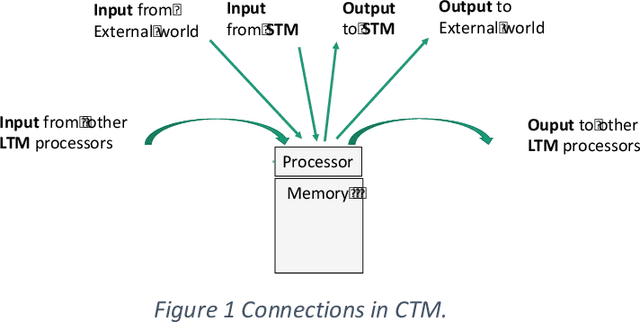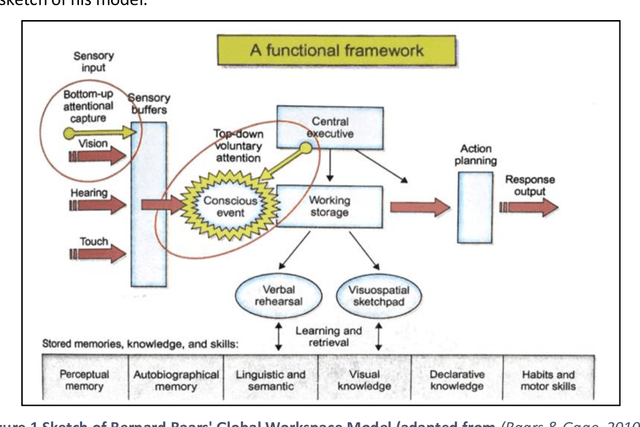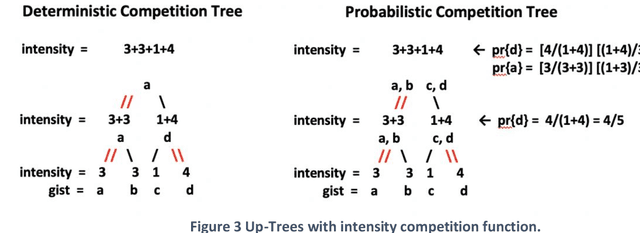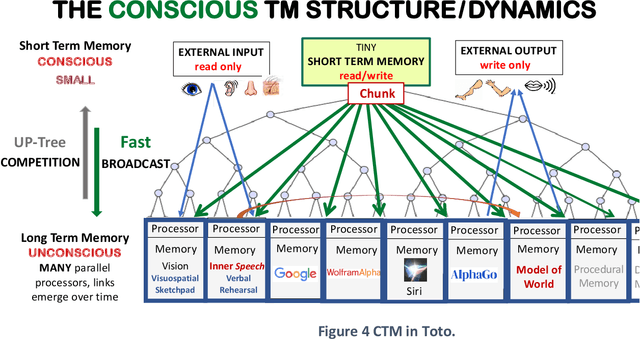Lenore Blum
AI Consciousness is Inevitable: A Theoretical Computer Science Perspective
Mar 25, 2024Abstract:We look at consciousness through the lens of Theoretical Computer Science, a branch of mathematics that studies computation under resource limitations. From this perspective, we develop a formal machine model for consciousness. The model is inspired by Alan Turing's simple yet powerful model of computation and Bernard Baars' theater model of consciousness. Though extremely simple, the model aligns at a high level with many of the major scientific theories of human and animal consciousness, supporting our claim that machine consciousness is inevitable.
Viewpoint: A Theoretical Computer Science Perspective on Consciousness and Artificial General Intelligence
Mar 30, 2023Abstract:We have defined the Conscious Turing Machine (CTM) for the purpose of investigating a Theoretical Computer Science (TCS) approach to consciousness. For this, we have hewn to the TCS demand for simplicity and understandability. The CTM is consequently and intentionally a simple machine. It is not a model of the brain, though its design has greatly benefited - and continues to benefit - from neuroscience and psychology. The CTM is a model of and for consciousness. Although it is developed to understand consciousness, the CTM offers a thoughtful and novel guide to the creation of an Artificial General Intelligence (AGI). For example, the CTM has an enormous number of powerful processors, some with specialized expertise, others unspecialized but poised to develop an expertise. For whatever problem must be dealt with, the CTM has an excellent way to utilize those processors that have the required knowledge, ability, and time to work on the problem, even if it is not aware of which ones these may be.
A Theoretical Computer Science Perspective on Free Will
Jun 25, 2022Abstract:We consider the paradoxical concept of free will from the perspective of Theoretical Computer Science (TCS), a branch of mathematics concerned with understanding the underlying principles of computation and complexity, including the implications and surprising consequences of resource limitations.
A Theory of Consciousness from a Theoretical Computer Science Perspective: Insights from the Conscious Turing Machine
Aug 23, 2021


Abstract:The quest to understand consciousness, once the purview of philosophers and theologians, is now actively pursued by scientists of many stripes. We examine consciousness from the perspective of theoretical computer science (TCS), a branch of mathematics concerned with understanding the underlying principles of computation and complexity, including the implications and surprising consequences of resource limitations. In the spirit of Alan Turing's simple yet powerful definition of a computer, the Turing Machine (TM), and perspective of computational complexity theory, we formalize a modified version of the Global Workspace Theory (GWT) of consciousness originated by cognitive neuroscientist Bernard Baars and further developed by him, Stanislas Dehaene, Jean-Pierre Changeaux and others. We are not looking for a complex model of the brain nor of cognition, but for a simple computational model of (the admittedly complex concept of) consciousness. We do this by defining the Conscious Turing Machine (CTM), also called a conscious AI, and then we define consciousness and related notions in the CTM. While these are only mathematical (TCS) definitions, we suggest why the CTM has the feeling of consciousness. The TCS perspective provides a simple formal framework to employ tools from computational complexity theory and machine learning to help us understand consciousness and related concepts. Previously we explored high level explanations for the feelings of pain and pleasure in the CTM. Here we consider three examples related to vision (blindsight, inattentional blindness, and change blindness), followed by discussions of dreams, free will, and altered states of consciousness.
A Theoretical Computer Science Perspective on Consciousness
Nov 18, 2020



Abstract:The quest to understand consciousness, once the purview of philosophers and theologians, is now actively pursued by scientists of many stripes. This paper studies consciousness from the perspective of theoretical computer science. It formalizes the Global Workspace Theory (GWT) originated by cognitive neuroscientist Bernard Baars and further developed by him, Stanislas Dehaene, and others. Our major contribution lies in the precise formal definition of a Conscious Turing Machine (CTM), also called a Conscious AI. We define the CTM in the spirit of Alan Turing's simple yet powerful definition of a computer, the Turing Machine (TM). We are not looking for a complex model of the brain nor of cognition but for a simple model of (the admittedly complex concept of) consciousness. After formally defining CTM, we give a formal definition of consciousness in CTM. We then suggest why the CTM has the feeling of consciousness. The reasonableness of the definitions and explanations can be judged by how well they agree with commonly accepted intuitive concepts of human consciousness, the breadth of related concepts that the model explains easily and naturally, and the extent of its agreement with scientific evidence.
 Add to Chrome
Add to Chrome Add to Firefox
Add to Firefox Add to Edge
Add to Edge